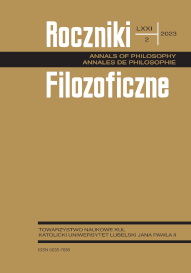IRIS MURDOCH’S CONCEPTION OF MORAL DEVELOPMENT IN HER NOVEL THE GOOD APPRENTICE
IRIS MURDOCH’S CONCEPTION OF MORAL DEVELOPMENT IN HER NOVEL THE GOOD APPRENTICE
Author(s): Anna Głąb Subject(s): Ethics / Practical Philosophy, Contemporary Philosophy, Theory of Literature, British Literature, Sociology of Literature
Published by: Towarzystwo Naukowe KUL & Katolicki Uniwersytet Lubelski Jana Pawła II
Keywords: Murdoch; The Good Apprentice; attention; moral life; transcendence of persons; love;
Summary/Abstract: The author juxtaposes two views of morality and the views of man they imply: one represented by behaviourist and existentialist approaches in theories of morality and the other proposed by Iris Murdoch, who stresses the ability to see and recognise morally significant characteristics. In Murdoch’s opinion, a person’s moral development consists in a change in the quality of consciousness as a result of the activity of attention in exploring moral reality. After contrasting these two views, the author confronts Murdoch’s approach with the conception of moral development understood along these lines as exemplified in a character of her novel The Good Apprentice. She also puts the problem of attention into the context of Murdoch’s conception of the transcendence of persons.
Journal: Roczniki Filozoficzne
- Issue Year: 71/2023
- Issue No: 2
- Page Range: 239-260
- Page Count: 22
- Language: English

